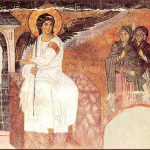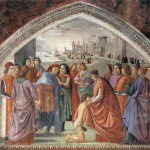![The temptation of Saint Anthony by Hieronymus Bosch [Public domain], via Wikimedia Commons](https://wp-media.patheos.com/blogs/sites/637/2017/04/The_temptation_of_Saint_Anthony_by_Jheronimus_Bosch_Kansas-193x300.jpg)
by Hieronymus Bosch [Public domain], via Wikimedia Commons
But the text need not be read as only for monks following Anthony into the desert. While that layer of the text is there, and it is a useful reminder for new monks about the challenges to come. Their interior life, what is in their mind, what habits of sin, what fantasies and vain imaginations which they bring with them into the cell will remain with them, and will not be left outside with the rest of society, and it is this interior life which is what they must confront in order to be true renunciants of the world and its sin. But this life, this struggle, is not just for those in the desert. It not just for those who are called to a monastic vocation. Everyone, even those in the world, find that they bring the interior life with them wherever they go, and they must also struggle with its temptations. Those living in the world will likely suffer more external temptations as they face others, day to day, so they will have to struggle with basic charity when confronted with those who insult or abuse them. They will have to curb their speech, since they are more likely to speak than those who live in the silence of the ascetic cell, and so likely more tempted to use speak rash words and use their tongue unrighteously.
Even if someone finds they are called to live in the world, they will find they are still called to take time to manifest silence in their lives, to retreat from the world as it were and find themselves in the inner cell of their heart and mind, where, cut off from the rest of the world, they can be alone with God and encounter him with prayer and meditation. Here, the spiritual battle monks face on a daily basis, will be met with them as they come to that silence. The average person, because of their active life in the world, might find their struggle greater because they have more baggage which they bring with them into that silence, but yet it will still be the same basic struggle. The mind will wander with vain imaginations, and they will have to find a way to silence them so that they can find moments of graceful peace with God.
The cell, then, is our own interior spiritual life. Fornication is not just sexual desire, but any inordinate desire which will direct us away from God. When we come to God in the silence of our heart, we see, through the imaginings of the mind, those things which we desire, which we long for, which distract us from God, and so find that spiritual fornication remains with us, tempting us away from God and into the limited good which those things could provide. Thus St. John of Kronstadt, speaking to those living in the world and not just those in the monastic cell, wrote:
Watch yourselves – your passions especially – in your home life, where they appear freely, like moles in a safe place. Outside our home, some of our passions are usually screened by other more decorous passions, whilst at home there is no possibility of driving away these black moles that undermine the integrity of our soul.[3]
Many of our interior impulses hide themselves from us in the recesses of our unconscious minds. They influence how we act, but because of various social contrivances, we find their appearances to be limited in our day to day life. We limit how they influence us because we desire not to shame ourselves in front of others, and yet, even then, they make sure we do not give our complete self over to what is right and just if such righteousness counters our inner desires. When we start searching ourselves, exploring the interior structures of the soul, we find their malignant influence over us, and then we are given a choice. We can either fight against them, trying to empty themselves from our inner life, or let ourselves be enslaved to the habits of the mind and body they create for us. If we decide to fight against them, this does not mean we will be victorious. Sometimes such passion will have deep roots in our psyche and the struggle will last years before we can uproot them; we must not despair or give up, but rather, constantly return to the struggle with grace, humbly accepting our weakness while opening ourselves up to God and letting him infuse us with his purifying flame of love, which, when it has wholly encompassed us, will finally cleanse us of all those habits of thought and deed seeded in our mind which we cannot overcome by ourselves. But until then, until we have become perfect through grace, we will find various inordinate desires seeded deep within forming the foundation for all kinds of temptation; we will find, every time we come back to our own inner cells, the spirit of fornication will be there with us, tempting us away from God by loving some lesser good which gives immediate but transient pleasure which can never truly satisfy. Let us pray we do not give in.
[1] The Sayings of the Desert Fathers. trans. Benedicta Ward (Kalamazoo, MI: Cistercian Publications, 1984), 3.
At last when the dragon could not even thus overthrow Antony, but saw himself thrust out of his heart, gnashing his teeth as it is written, and as it were beside himself, he appeared to Antony like a black boy, taking a visible shape in accordance with the colour of his mind. And cringing to him, as it were, he plied him with thoughts no longer, for guileful as he was, he had been worsted, but at last spoke in human voice and said, ‘Many I deceived, many I cast down; but now attacking you and your labours as I had many others, I proved weak.’ When Antony asked, Who are you who speakest thus with me? He answered with a lamentable voice, ‘I am the friend of whoredom, and have taken upon me incitements which lead to it against the young. I am called the spirit of lust. How many have I deceived who wished to live soberly, how many are the chaste whom by my incitements I have over-persuaded! I am he on account of whom also the prophet reproves those who have fallen, saying Hosea 4:12, “You have been caused to err by the spirit of whoredom.” For by me they have been tripped up. I am he who have so often troubled you and have so often been overthrown by you.’ But Antony having given thanks to the Lord, with good courage said to him, ‘You are very despicable then, for you are black-hearted and weak as a child. Henceforth I shall have no trouble from you , “for the Lord is my helper, and I shall look down on mine enemies.”‘ Having heard this, the black one straightway fled, shuddering at the words and dreading any longer even to come near the man.
–St. Athanasius, Life of Antony in NPNF2(4):197.
[3] St. John of Kronstadt, My Life in Christ. trans. E.E. Goulaeff (Jordanville, NY: Holy Trinity Monastery, 2000), 33.
Stay in touch! Like A Little Bit of Nothing on Facebook:
A Little Bit of Nothing













